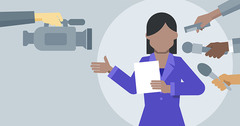Processing Request...
Processing Request...


Advertising, promotions, and marketing managers plan programs to generate interest in a product or service. They work with art directors, sales agents, and financial staff members.
了解更多

Arbitrators, mediators, and conciliators help resolve conflicts outside of the court system by facilitating negotiation and dialogue between disputing parties.
了解更多

Lawyers advise and represent individuals, businesses, and government agencies on legal issues and disputes.
了解更多

Market research analysts study market conditions to examine potential sales of a product or service. They help companies understand what products people want, who will buy them, and at what price.
了解更多

Political scientists study the origin, development, and operation of political systems. They research political ideas and analyze governments, policies, political trends, and related issues.
了解更多

Psychologists study cognitive, emotional, and social processes and human behavior by observing, interpreting, and recording how people relate to one another and their environments.
了解更多

Public relations specialists create and maintain a favorable public image for the organization they represent. They design media releases to shape public perception of their organization and to increase awareness of its work and goals.
了解更多

Reporters, correspondents, and broadcast news analysts inform the public about news and events happening internationally, nationally, and locally. They report the news for newspapers, magazines, websites, television, and radio.
了解更多

Sales engineers sell complex scientific and technological products or services to businesses. They must have extensive knowledge of the products’ parts and functions and must understand the scientific processes that make these products work.
了解更多

Sales managers direct sales teams of organizations. They set sales goals, analyze data, and develop training programs for the sales representatives of the organization.
了解更多

Sociologists study society and social behavior by examining the groups, cultures, organizations, social institutions, and processes that people develop.
了解更多

Writers and authors develop original written content for advertisements, books, magazines, movie and television scripts, songs, and online publications.
了解更多